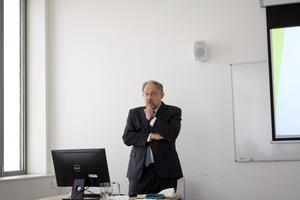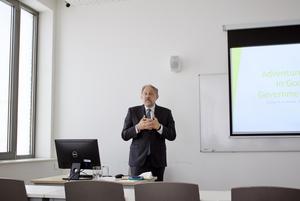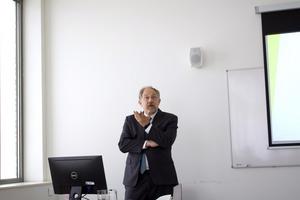The lecture titled "Adventures in Good Government" was held at the invitation of the Faculty of Public Governance and International Studies by Professor Charles N. W. Keckler. In his presentation, the professor from George Mason University, Schar School of Policy and Government, not only presented the expectations behind government reforms but also discussed the target groups of these reforms and what characteristics define measures that contribute to successful governmental efficiency.
With extensive experience in both government and academia, Professor Keckler previously served multiple times as the Deputy Assistant Secretary for Health in the American government and is recognised as a researcher in the American federal governance system. Equipped with direct insight and practical knowledge, he guided students majoring in International Public Management BA through the topic of good governance. According to him, government reforms are about making mundane things exciting or, vice versa, making exciting things mundane. That is, how to grasp standardisation and process management elements from new perspectives. As he emphasised, the sole important measure of efficiency enhancement in public administration is the higher return on public investments, meaning more excellent public utility per unit of invested funds. Therefore, he stressed in his presentation that implementing reforms primarily involves not immediate cost reduction but rather a different approach. Those working in areas affected by reforms must be motivated to achieve more efficient results with the same available resources. This, in turn, elevates the outcomes of programs. However, further reforms depend on interested experts, thus necessitating the mobilisation of administrative professionals who possess a suitable vision for increasing efficiency and can ensure that savings are reinvested into program outcomes in the future.
He presented the paradox of good government reforms aimed at increasing efficiency, highlighting that the budgets available in public administration are allocated to specific goals and outcomes rather than the alteration or reform of original activities. Every employee has specific, defined tasks in administrative processes, and changing these tasks is not typically part of the default situation. There are few natural driving forces motivating change, as those who implement change rarely enjoy its benefits!
As a practical example, he showcased certain stages and results of a reform process conducted within the United States Department of Health and Human Services (HHS) starting in 2017. The ReImagine HHS framework program (2017-2020) was to achieve greater effectiveness by promoting innovative solutions, institutionalising continuous development, and enhancing strategic collaboration with internal and external partners. In the process, every employee formulated their reform proposals. From this pool of ideas developed by 25 departments and over 200 employees, six strategic changes were synthesised and prioritised, transforming the culture and operations across the entire department. This led to establishing interdepartmental shared service centers, which can also serve as examples for future efficiency enhancements. The program received significant recognition and several innovation awards.
At the end of his presentation, he identified artificial intelligence's appropriate application and involvement as the next major challenge. It will be a challenge for the entire public administration to identify processes that can be automated, where overloaded personnel are located, and how new applications can be developed with the involvement of AI to increase their performance.
Text: Faculty of Public Governance and International Studies
Photo: András Szabó


